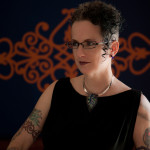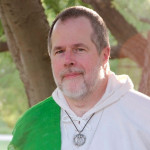Pagan Voices is a spotlight on recent quotations from figures within the Pagan community. These voices may appear in the burgeoning Pagan media, or from a mainstream outlet, but all showcase our wisdom, thought processes, and evolution in the public eye. Is there a Pagan voice you’d like to see highlighted? Drop me a line with a link to the story, post, or audio.
“Religion, group spiritual engagement, is an aspect of culture, the way a group of people does things. It is learned from those you are with. In today’s world we are exposed to many ‘ways’ and have the opportunity to choose how we will live our lives from among them, even religiously. In the ancient world, while visiting or living in a different culture, one makes offerings to the Gods of the host culture. It is simply polite. If one adopted or was adopted by a culture, one could fully participate in that religious life: if you spoke Greek, you could participate in the Eleusinian mysteries, no matter where you were from. Some today are taking a recent notion of nationhood, one developed only since the mid-1700s, and reifying it into a false concept of ‘race’. Then they assign who should worship which pantheon. Normally I would not care. There are only a few behaviors in our fairly antinomian subculture that are unacceptable. Violence and abuse are among them. So is racism, itself a kind of abuse. Taking one’s genome as determinant of who one should worship is simply another form of racism. It is a way of creating division amongst humans unfounded on any facts, on any reality, other than a misconstrued notion of what makes a people, what makes a culture. Culture, and religion, is found in what you do, not your bloodline. Those who use the idea of culture or religion as tied to one’s genetic inheritance are attempting to sneak racism into Paganism, and this must not be tolerated. It must be spotted, called out and banished. Not in Our House.” – Sam Webster, asserting that religious biological determinism is racism.
“This is a follow up to my last post, “Whose Ancestors?“, published on 8/29/2013. The post was also published at my PaganSquare blog, The Spear That Cries Out, hosted by Witches & Pagans online. It was subsequently deleted by the site’s editor, Anne Newkirk Niven, specifically in order to censor its content, because she objected to my calling the AFA a racist organization. The following is my response to that censorship, and I’ve also posted it on the PaganSquare site. Since it too is likely to be deleted, I am publishing it here as well. I wanted to let readers know what happened with that post, and what you can expect in the future. The post in question, “Whose Ancestors?”, was one in which I challenged the doctrine of racial separatism in religion espoused by some European polytheist traditions, primarily Heathens of the ‘folkish’ variety. In it, I called the AFA an unashamedly racist organization. I firmly believe this to be true, and when Anne Newkirk Niven, the editor of this site, asked me to remove the language in which I called the AFA racist, I refused to do so. Instead, I provided her with evidence as to the facts showing that the AFA is a racist organization. Since I would not edit the post to remove that language, Anne has deleted my post in order to censor it. You can read the original post here, where it is still hosted on my own blog site.” – Morpheus Ravenna, following up on her “Whose Ancestors?” piece, which I quoted in a previous edition of Pagan Voices.
“I do know one thing very deeply: my gods aren’t racists, even when the cultures they came from have been racist. I can’t say for certain who among my ancestors were racists (though I know several of the recent ones definitely were), or if whole cultures of my ancestors were racists (and some of them certainly were, in overt as well as covert ways), but I am very certain that the gods generally don’t care, and likely never have, about who worships them, nor do they have ideas about who “is fit to” or who “should” worship them based on genetic or even cultural heritage. For all of the faults of the various ancient cultures that I spiritually descend from, one thing we can say for certain is that they were not racist about their gods [...] No, none of these cultures had a perfect record when it came to dealing with other cultures; certainly, there were ideas of superiority, there were cases of cultural appropriation, there was slavery and imperialism and lots of other horrible things involved in many of these cases. But, at least the gods and their approaches to them tended to be relatively unconcerned with matters of race, or appropriateness of different races worshipping different gods…at least in many cases. While I find the notion of saying that people should only worship the gods and follow the spiritual paths of their genetic ancestors very problematic, likewise I find the notion that for reconstructionist-methodology-using polytheists, there should be “no contamination” from other cultural traditions or gods going on…well, laughable. It doesn’t take much looking at the actual sources and what has come down from the medieval and ancient worlds to see that such cultural exclusivism wasn’t going on at all, whether in the polytheistic periods or in the Christian periods of the cultures concerned.” – P. Sufenas Virius Lupus, noting that gods aren’t racists.
“Do you really think it’s wise to put up works illegally by people who have written material about how to properly curse and hex? If you can’t afford books, fine. Go to the library. Borrow from your friends. Use a free ebook app and get legal material to read? (Hint: not only are there a lot of free books available regularly for the Kindle, but there are also those great public domain titles as well as academic institutions who have material freely available. Don’t believe me? Go look up the Oriental Institute and their publications.) And I will note this, if you can afford a smartphone and the monthly plan, I am sure you can find some room in your budget for a $15 text. In short, stop stealing. Give credit where it is due. Ask permission. You are reading this on the internet right now. Most every author has some sort of Web presence. They might have material available or know where to get it below cost if it is really a matter of finances for you. Or search online for used copies. Which is, incidentally, acceptable under copyright. And if you messed up and did something stupid, admit to it. If you are hosting a web site or Facebook group filled with illegal pdfs, DELETE THEM. And don’t go whining when you get called out, or ban people right and left for pointing out the fact that you are breaking the law. Support your community. We’re still a minority. We still have to fight for rights because of our religious and spiritual practices. Breaking the law does not do a thing to help us.” – Soli / Shezatwepwawet, on why stealing/pirating Pagan books on the Internet is a bad idea.
“Not too long ago, I watched a brief video created by our local public broadcasting station featuring footage of the Bull Run watershed. Nestled in the lower slopes of Mt. Hood and surrounding regions, this watershed provides Portland and other local communities with our superbly clean tap water. It’s closed to the public to protect the land and water from pollution, so few people have actually seen what’s in this vast, fenced-off area. Oregon Public Broadcasting got a rare opportunity to film parts of it to show the rest of us what we’re missing out on. The video showed some unexpected sights, to include a couple of abandoned stone fountains, but the part that impressed me the most was the river itself. Clear and beautiful, it splashes through an idyllic northwest conifer forest. I also didn’t realize just how small it was, at least where it was filmed. Of course, it gets bigger as more streams feed into it further on. But I was struck by the vulnerability of our water source, fed from rain and snow melt, and it made me review my own use of this limited commodity. See, we take water for granted all too often. We assume there’s enough for everything from drinking to watering golf courses in the desert to agriculture in the former Dust Bowl. But the Colorado River no longer reaches its terminus in the Sea of Cortez, the water table that feeds the Midwest has been severely depleted in less than a century, and yet we keep using fresh water like it’ll never run dry. Some people talk about desalinating ocean water, but this doesn’t address the ecosystems where the fresh water has been so depleted that they’re permanently damaged; we only think of ourselves.” – Lupa, on saving our water.
“We hide so much. We lie so much. We fear so much. This keeps us away from love. If we can come to be honest about our heartbreak, about our terror, about the ways in which failure dogs us, or hope makes us feel insecure, if we can come to be honest about our need to feel desired, our quest for recognition, the ways in which we have been hurting, and have hurt others, the ways in which we found laughter and joy, or worked through some pain…we can come to better know ourselves. We can come to better know one another. We can develop true compassion. We can know the world. We can imagine something better than ambition for money or power over others. We can imagine a place where we truly meet one another, truly see one another, where we stop playing status games: baring our necks or lording it over one another. In doing this, we open more fully to the flow of love. We heal. There have been many things planted in the soil of my life, things that have grown into a person, an adult, a human still figuring out how to more fully love the world.” – T. Thorn Coyle, on being naked and unashamed.
“I have been lecturing on Voodoo and Santeria for over fifteen years, and believe me I get a lot of weird questions. Many people wish to connect with the energies of the religion but are not initiated or under the proper guidance of their spiritual godparents. I had one woman after I became distracted after the end of my workshop come over dip her finger in the liquified candle wax from my Oshun candle and anoint her dog. I thought I saw something out of the corner of my eye but I let it go. Some time later I saw her again at one of my lectures and she listened intensely as I spoke of Oshun, the goddess of love and fertility. When the class was over, she came up to me and confessed the deed. I ask her what the dog was like now, she said it ate all her underwear. Obviously I don’t recommend this as a method of connecting with spirit, although it was quite amusing. There are several ways in Voodoo and Santeria to connect by performing ritual cleansings of your space. Some of the simplest involve the sprinkling of Florida Water and black salt in the corners of the home during the waning moon, this can be done in conjunction with the burning of white and/or black candles.” - Lilith Dorsey, on the importance of proper training, and proper ritual cleansing.
“My belief we’re here for a purpose doesn’t flow from my Pagan religion. It comes from something before that, from some deep intuition. It’s part of that “core being” I wrote about in the last post. It’s the same core intuition that told me the fundamentalist religion of my childhood couldn’t be right. It’s the same core intuition that clicked when someone first explained modern Paganism and clicked again when I discovered Druidry. It whispers “there’s more” – more to Life than the apparent world. I can hear the Religious Naturalists sighing – I’m sure to them I sound like the kid who opens his 27th Yule present and then cries “is that all?” The natural world is beautiful and powerful and life-affirming and we are lucky to be here. It is enough and more isn’t necessary. But that core intuition keeps whispering “there’s more” – something more than what is measurable. And part of that more is a reason for being here, a purpose for my life.” – John Beckett, on purpose and will.
Finally, here’s a video interview with Karagan Griffith, discussing the documentary film “With Love from Salem” (which I reviewed here).
http://www.youtube.com/watch?v=HKTHSfHQJgM
That’s all I have now, have a great day!

























